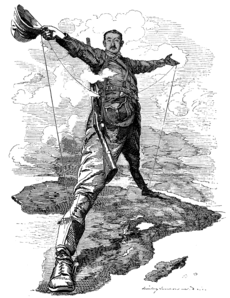World history/WHME102/Nineteenth century imperialism/Overview
The 'long nineteenth century' is the term many historians use to describe the period of time from the French Revolution (1789) to the outbreak of World War One (1914). The Napoleonic wars and other revolutionary violence meant the early years of this period were characterized by conflict in Europe. Following the 1815 Treaty of Vienna, however, Europe entered almost a century of relative peace and prosperity. A striking feature of this period was imperialism, with England, France, Germany and other European states seizing vast swathes of territory in Africa, Asia and Oceania. Colonies became a symbol of power. They also became important for trade and settlement. In this learning pathway you will learn about imperialism during the long nineteenth century, and how European powers used their superior military, technological and industrial strength to seize and subjugate territory and peoples across the globe.
During this learning pathway you will watch/listen to two lectures, and complete three readings.
